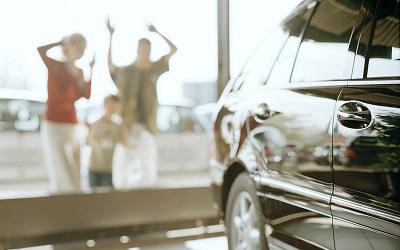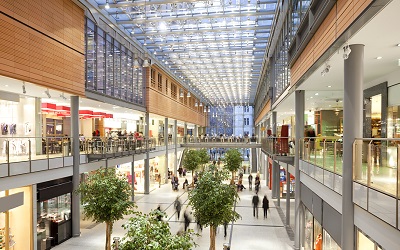RTLS Solutions in Tourism
The tourism industry is constantly trying to find new ways to attract and retain customers. The use of Real-Time Locating Systems (RTLS) offers the opportunity to stand out from the competition, promote additional sales and improve the travel experience for customers. Mobile apps connected with positioning technologies are particularly promising.
More information on BLE 4.0 / 5.1 tags (beacons)Indoor Navigation in Shopping Centers
Where to find what? What current offers are there? How do I get to my desired store? Customers have this information right at their fingertips in a shopping center app. Indoor navigation as well as other services make the shopping experience more enjoyable and enriching for the customer. Automatic positioning, even in interior spaces, locates the customer on a digital map – enabling easier orientation and navigation. This map can also be integrated into kiosk systems or the website.
There are also a wide range of display options for stores and restaurants. Opening times, photos, information on the product range and contact options increase visibility enormously. Using location-based marketing, retailers reach their target group directly: additional purchase incentives can be employed independent of the location and interests of the user, e.g. via push messages and coupons. The “Around me” function provides an overview of all stores in the user’s environment.
DIGITAL SERVICES FOR HOTEL GUESTS

OFFICE, Hotels want to be prepared for travelers who expect personal service – preferably with digital support. If the reception desk already knows about the guest’s preferences before arrival, it can score points with “surprise quality” – for example, if the guest’s favorite drink is prepared at check-in. The guest data can also be transmitted digitally, eliminating the need to fill out forms. If the system works with beacon technology, the check-in process can be initiated automatically upon arrival and the guest can receive a welcome message and individual offers to book. Other possible features of a hotel app include mobile door opening or the ability to report problems or malfunctions.
LOCATION-BASED INFORMATION

Destinations face the challenge of distinguishing themselves from the masses by setting individual focuses. If, for example, a destination app can access a guest’s preferences and current location, it is possible to submit relevant offers during the entire customer journey that will make his or her holiday unforgettable. Beacons deployed throughout the destination can locate the app user and trigger location-specific information on attractions and events. Similarly, museum or zoo apps can provide visitors with information and interactive content on nearby exhibits and animals. When entering a tourist facility, guests can receive a welcome message and individual offers.
Technical Implementation
The existing technical infrastructure can directly be used in many cases. Depending on the requirement, the operator choses a client-based (app is necessary, positioning via Wi-Fi, Bluetooth beacons and sensor fusion, including a back channel) or a server-based solution (no app required; positioning via KKM Locator Nodes; detection of Wi-Fi devices, Bluetooth beacons, Ultra-wideband or RFID modules; no back channel available). High-precision solutions with low latencies can be implemented on the basis of Ultra-wideband (UWB). The use of RFID is suitable for a point-specific object identification with high unit numbers.
Indoor navigation software by KKM can be implemented in existing applications, websites and hospital information systems. The accuracy is – depending on the technical realization – up to ten centimeters or less.

